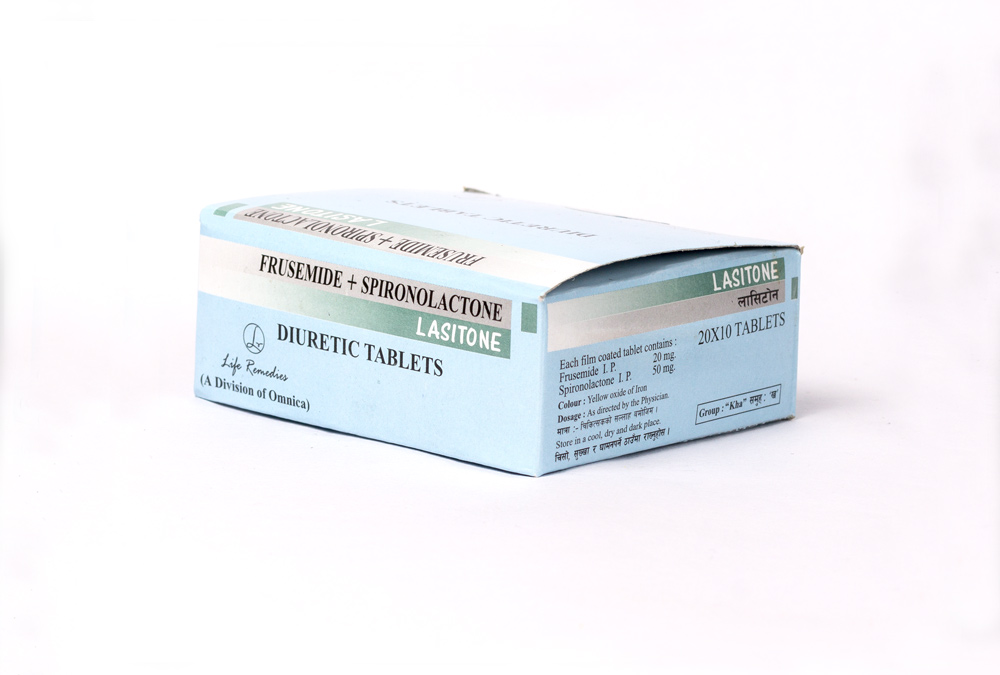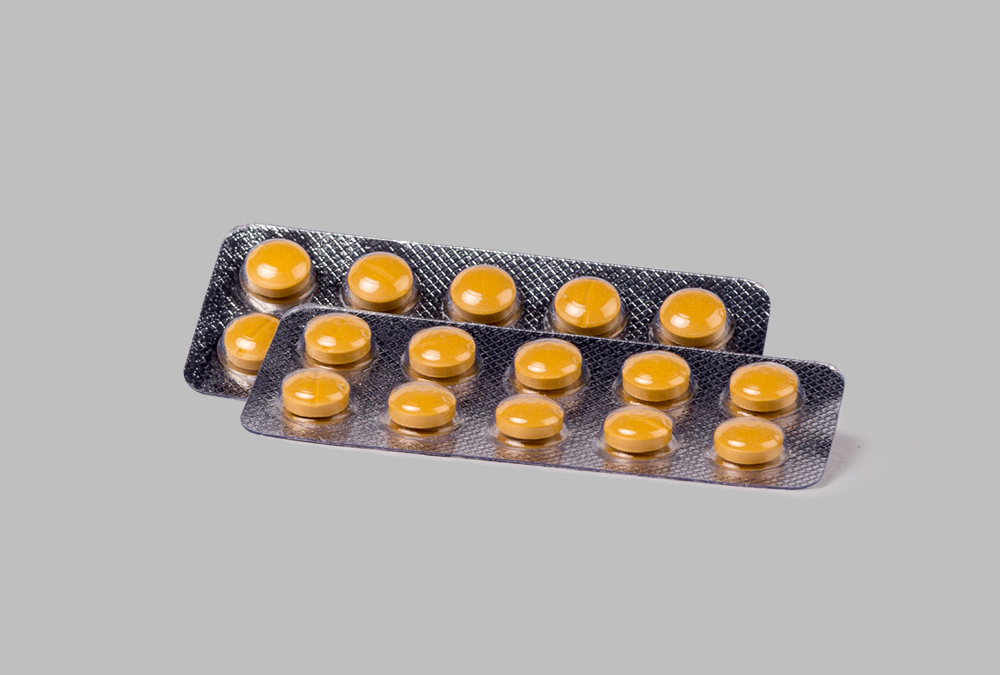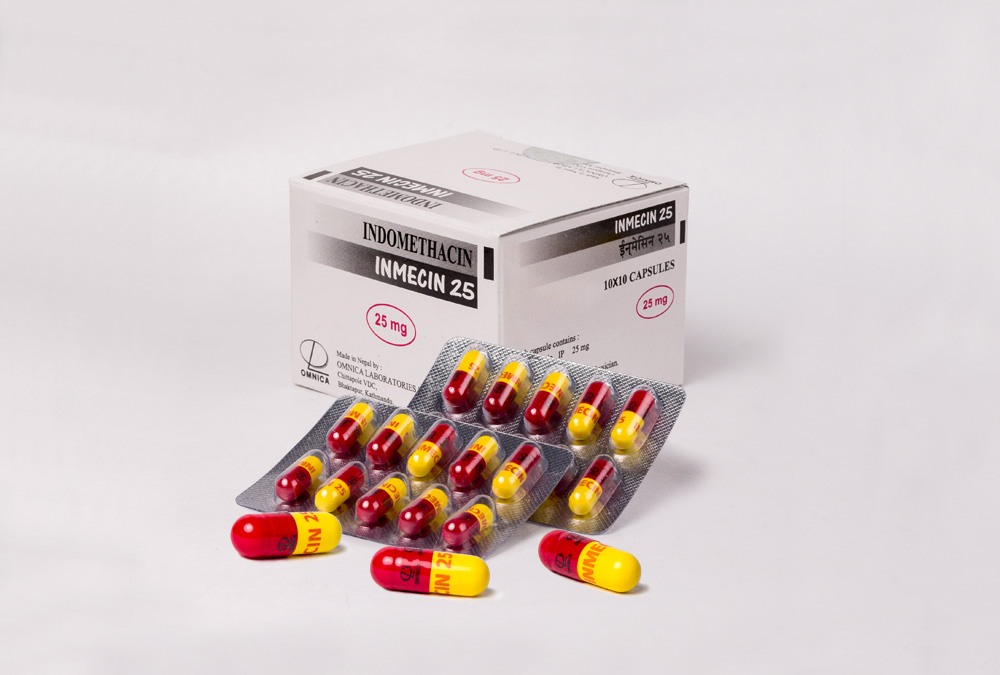Brand Name : LASITONE
Generic Name : Frusemide 20 mg + Spironolactone 50 mg
Preparation : Film Coated Tablet
Pharmacological Category : Diuretic
Mechanism of Action (MOA)
Frusemide blocks chloride binding site on the sodium-potassium-chloride cotransporter (Na+K+2Cl–) in the thick ascending loop of Henle. Thus, excretion of sodium, potassium, chloride ions is increased and water excretion is enhanced.
Spironolactone inhibits binding of aldosterone with its receptor at Na-K exchange site in the distal renal tubule. Thus, spironolactone inhibits the action of aldosterone and causes kidneys to promote sodium excretion along with water and conserves potassium.
Pharmacokinetics
- Absorption :
Frusemide : Absorbed from the gastrointestinal tract
Spironolactone : Well absorbed from the gastrointestinal tract - Onset of Action :
Frusemide : 30 minutes to 1 hour
Spironolactone : 2 to 4 hours - Peak Effect :
Frusemide : 1 to 2 hours
Spironolactone : 2 to 3 days - Protein Binding :
Frusemide : 91 to 99%;
Spironolactone : About 90% - Metabolism :
Frusemide : Liver (nearly 10%);
Spironolactone : Liver and kidney - Elimination Half-life :
Frusemide : 0.5 to 2 hours
Spironolactone : 1.3 to 1.4 hours - Excretion :
Frusemide : Urine
Spironolactone : Urine and faeces
Indications and Dosage
- Edema associated with Congestive Heart Failure, Liver Cirrhosis and Renal Disease (Nephrotic Syndrome) : One to four tablets of LASITONE daily
Side Effects
Most adverse effects occur with high doses, and serious side effects are uncommon.
COMMON : Hyponatremia and hypochloraemic alkalosis after large doses or prolonged use.
Signs of electrolyte imbalance include headache, hypotension, muscle cramps, dry mouth, thirst, weakness, lethargy, drowsiness, restlessness, oliguria, cardiac arrhythmias, and gastrointestinal disturbances
SEEN : Hypovolemia and dehydration especially in the elders, hyperuricemia and precipitate gout in some patients, ataxia, mental confusion, skin rashes, mild acidosis, blurred vision, yellow vision, dizziness, orthostatic hypotension, gynaecomastia, deepening of voice, menstrual irregularities, impotence
RARE : Breast enlargement may persist. Others include interstitial nephritis, vasculitis, fever, agranulocytosis, thrombocytopenia and leucopenia.
Contraindications
Hypersensitivity to frusemide or sulfonamides and spironolactone, anuria, severe renal impairment, acute renal insufficiency, Addison’s disease or other conditions associated with hyperkalemia, coadministration with eplerenone
Warnings / Precautions
- All diuretics produce changes in fluid and electrolyte balance so should be used cautiously especially in elderly.
- Should be avoided in patients with severe hepatic impairment, in whom encephalopathy may be precipitated.
- All patients should be carefully observed for signs of fluid and electrolyte imbalance, especially in the presence of vomiting or during parenteral fluid therapy.
- Caution in renal impairment, prostatic hyperplasia, diabetes mellitus, diabetic nephropathy, fluid and electrolyte imbalance, hepatic disease, renal disease, metabolic acidosis, concomitant use with potassium sparing diuretics or ACE inhibitors.
- Caution during pregnancy and breast feeding and is not recommended for pregnancy induced hypertension.
- Risk of gynecomastia and male sexual dysfunction.
- Somnolence may occur, caution when operating heavy machinery.
Drug Interactions
- Frusemide may enhance the nephrotoxicity of cephalosporin antibacterials.
- Frusemide can enhance the ototoxicity of aminoglycoside antibacterials and ototoxic drugs.
- Frusemide enhance the effect of alpha blockers / ACE inhibitors.
- Antihypertensive effects of frusemide may be antagonized by corticosteroids, NSAIDs.
- Frusemide and spironolactone may enhance lithium toxicity and the nephrotoxicity of NSAIDs.
- Alcohol, barbiturates, opioids or narcotics may potentiate orthostatic hypotension.
- Risk of hyperkalemia if spironolactone is used with potassium supplements or other potassium-sparing diuretics, ACE inhibitors, angiotensin II antagonists, NSAIDs, ciclosporin, trilostane, aldosterone blockers.
- Hyponatremia may occur in patients taking a potassium-sparing diuretic with a thiazide.
- Frusemide and spironolactone may reduce the ulcer-healing properties of carbenoxolone.
- Spironolactone may enhance the effects of other antihypertensive drugs and may reduce vascular responses to noradrenaline.
- With corticosteroids and adrenocorticotropic hormone may lead to intensified electrolyte depletion particularly hypokalemia.
- Frusemide and spironolactone may increase digoxin toxicity.
Pregnancy Category : C
Presentation
LASITONE : A box of 20 blisters, each blister of 10 tablets







